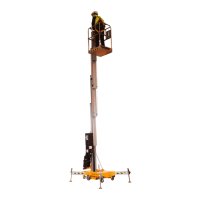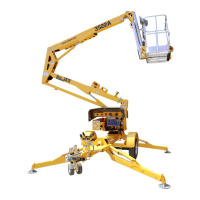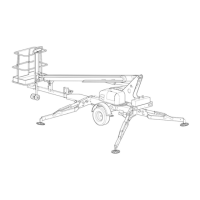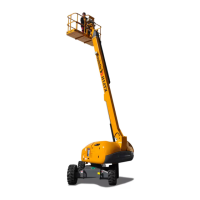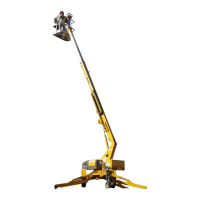1.3 - RESIDUAL RISKS
1.3.1 - Risks of trembling or overturning
The risks of trembling or overturning are high in the following situations:
- sudden action on the control levers,
- platform overload,
- ground collapse (be careful during thaw periods in winter),
- gusts of wind,
- hitting an obstacle on the ground or overhead,
- working on raised pavements, etc.
1.3.2 - Electric risks
If the machine has a 220 V, 16A max.
socket, the extension must be
connected to a mains socket,
protected by a 30mA differential
circuit breaker.
Electric risks are high in the following situations:
- contact with a live line,
- use during storms.
See “Minimum safety distances”, page 6
1.3.3 - Risks of explosion or burning
The risks of explosion or burning are high in the following situations:
- work in an explosive or inflammable atmosphere,
- use of a machine with a hydraulic leak.
1.3.4 - Risks of collision
- Risk o f crushing people lo cated within the m achine’s op erating
area.
- The operator must evaluate any overhead risks before using the
machine.
1.4 - VERIFICATIONS
Comply with current legislation in the country of use.
In FRANCE: Order dated March 1st 2004 + DRT 2005-04 instruction dated
march 24th 2005 specifying:
1.4.1 - Periodic checks
The machine must be examined every 6 months to detect any defects that
may cause an accident.
These examinations are carried out by an external organisation or a person
specially appointed by the company manager and reporting directly to him
(employee of the company or otherwise) Articles R 233-5 and R 233-11 of
the Labour Code.
The results of these examinations are recorded in a safety log kept by the
company manager, available at all times to the fa ctory inspector and the
company’s hea lth an d safety com mittee, if the re is on e. The list of an y
specially appointed persons is also to be available similarly (Article R 233-
5 of the Labour Code).
NOTE: This log can be obtained from professional organisations and
from the OPPBTP or private prevention organisations.
The appointed persons must be experienced in the field of risk prevention
(Articles R 233-11 of decree no. 93-41).
No-one may perform any verifications during machine operation (Article R
233-11 of the Labour Code).
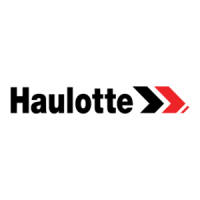
